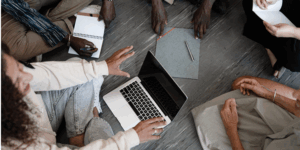
On Demand
$0.00
Freedom of Expression, Artificial Intelligence & Elections
This course is also available in French, Arabic, Spanish, and Portuguese.
Welcome to the on demand course «Freedom of Expression, Artificial Intelligence and Elections,» organized by the Knight Center for Journalism in the Americas, in collaboration with UNESCO, UNDP, and with support of the Electoral Assistance Division (EAD) of the Department of Political and Peacebuilding Affairs (DPPA).
Throughout this four-module on demand online course, students will learn and explore the fascinating and ever-evolving world of technology and democracy, in particular on the impact of Artificial Intelligence on freedom of expression in elections.
This course is designed for electoral practitioners and regulators, journalists and media professionals, civil society organizations focusing on elections, human rights, and gender equality, students and educators, as well as voters and citizens interested in understanding AI and its impact on democracy.
This 4-week on demand course is designed to equip you with the knowledge and skills to understand the impact of AI on freedom of expression and access to information during elections. By exploring international standards and analyzing the impact of AI on information, you will learn to identify potential threats such as AI-generated disinformation and hate speech. Additionally, the course will provide you practical skills such as Media and Information Literacy (MIL) tools, AI based applications, and an understanding of Technology-Facilitated Gender-Based Violence.
You will also learn about ethical considerations related to AI and its role in contributing to transparent, inclusive and credible elections in the digital age. By completing this course, you will be prepared to be an informed participant in shaping the future of elections.
The course material is organized into four modules:
- Module 1 introduces participants to the intersection of AI and freedom of expression in electoral contexts, exploring international standards and the ethical implications of AI.
- Module 2 delves into the challenges of disinformation, hate speech, and gender-based violence in elections, examining AI’s role and strategies for mitigation.
- Module 3 focuses on collaborative responses to combat harmful AI-generated content, emphasizing tools and strategies for various stakeholders.
-
Module 4 equips participants with individual skills and tools to address harmful practices in information integrity during elections, including MIL tools, emphasizing ethical considerations and practical strategies.
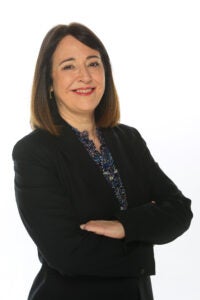 Albertina Piterbarg is a senior Electoral Expert and journalist at the UNESCO Freedom of Expression and Security of Journalists section. With over 20 years of experience, she has worked in the fields of electoral observation, communications, civic and voter education, electoral-related conflict prevention, and women’s political participation in organizations like the Organization of the American States (OAS), UN Peacekeeping Operations (DPKO), UNDP, UN Women, and UNESCO. Her roles have included head of office, team leader, field officer, government advisor, and independent consultant. Albertina has undertaken international missions in various countries across Africa, Asia, and Latin America, including Niger, Ivory Coast, Tunisia, Libya, East Timor, New Caledonia, Mexico, Bolivia, Colombia, Ecuador, Dominican Republic, and Venezuela. She studied Philosophy and Literature at the University of Buenos Aires. She is a certified BRIDGE trainer and holds a master’s degree in journalism from Saint Andrews University of Argentina, where she received the Outstanding University Graduate award in 2018.
Albertina Piterbarg is a senior Electoral Expert and journalist at the UNESCO Freedom of Expression and Security of Journalists section. With over 20 years of experience, she has worked in the fields of electoral observation, communications, civic and voter education, electoral-related conflict prevention, and women’s political participation in organizations like the Organization of the American States (OAS), UN Peacekeeping Operations (DPKO), UNDP, UN Women, and UNESCO. Her roles have included head of office, team leader, field officer, government advisor, and independent consultant. Albertina has undertaken international missions in various countries across Africa, Asia, and Latin America, including Niger, Ivory Coast, Tunisia, Libya, East Timor, New Caledonia, Mexico, Bolivia, Colombia, Ecuador, Dominican Republic, and Venezuela. She studied Philosophy and Literature at the University of Buenos Aires. She is a certified BRIDGE trainer and holds a master’s degree in journalism from Saint Andrews University of Argentina, where she received the Outstanding University Graduate award in 2018.
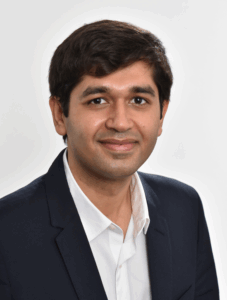 Prateek Sibal is a Programme Specialist at the Digital Policies and Digital Transformation Section of the Communication and Information Sector at UNESCO Headquarters in Paris, France. In this framework, he leads the Sector’s work on artificial intelligence and digital transformation with a focus on capacity building for the executive, legislative and the judicial branches of government. The programmes he leads have supported over 100 countries across Africa, Asia, Latin America and Europe in their digital transformation journey.
Prateek Sibal is a Programme Specialist at the Digital Policies and Digital Transformation Section of the Communication and Information Sector at UNESCO Headquarters in Paris, France. In this framework, he leads the Sector’s work on artificial intelligence and digital transformation with a focus on capacity building for the executive, legislative and the judicial branches of government. The programmes he leads have supported over 100 countries across Africa, Asia, Latin America and Europe in their digital transformation journey.
He represents UNESCO at GlobalPolicy.AI, a platform of exchange on AI policies among 8 inter-governmental organisations, including the World Bank, OECD, European Commission, Inter-American Development Bank, Council of Europe. He is a member of the OECD Working Group on AI, Working Group on “Open AI Definition” of the Digital Public Goods Alliance, Law and Technology Working Group of the World Bank’s Global Forum on Law, Justice, and Development, African Union’s AI Working Group and an observer at the Council of Europe’s Committee working on the Convention on AI.
In thepast, he has worked for a Member of Parliament in India, consulted for the City Government of Vancouver, REN21, Paris and founded a multilingual education start-up to publish books in tribal languages in India.
He teaches digital government at Sciences Po, Paris as an adjunct faculty.
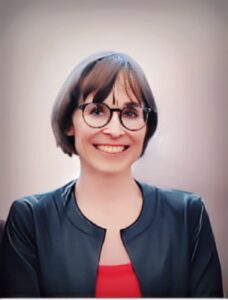 Tatiana Monney is an electoral expert for the United Nations Development Programme (UNDP) in the Governance Team of the Bureau for Policy and Programme Support (BPPS). She brings 20 years of experience in electoral assistance, governance and peacebuilding with the United Nations, the Swiss Federal Department of Foreign Affairs (FDFA) and the European Union (EU). She specializes on dialogue and conflict prevention. She is also a member of High-level Expert Group on digital Conflict of the Center for the Humanitarian Dialogue. From 2018 to 2020, Tatiana Monney worked as a Senior Electoral Adviser for the European External Action Service of the European Union. For the Swiss FDFA (2012-2018), she managed the programme on “Peace, Elections and Democracy» and facilitated negotiation processes between electoral management bodies and political parties in Tunisia, Egypt, Myanmar, Georgia and Zimbabwe. She also managed the Swiss Peacebuilding programme in Sahel from 2011-2012. Prior to this she worked as an Electoral Adviser for the United Nations Mission in Liberia (2010-2011) and for the Electoral Assistance Division of the Department for Political Affairs and Peacebuilding (in New York – 2007 to 2009- and in New Caledonia – February to June 2017). Ms. Monney co-edited a publication on the facilitation of electoral codes of conduct for political parties with International IIDEA in 2017 and edited a FDFA publication on «Elections to Peace in 2019”.
Tatiana Monney is an electoral expert for the United Nations Development Programme (UNDP) in the Governance Team of the Bureau for Policy and Programme Support (BPPS). She brings 20 years of experience in electoral assistance, governance and peacebuilding with the United Nations, the Swiss Federal Department of Foreign Affairs (FDFA) and the European Union (EU). She specializes on dialogue and conflict prevention. She is also a member of High-level Expert Group on digital Conflict of the Center for the Humanitarian Dialogue. From 2018 to 2020, Tatiana Monney worked as a Senior Electoral Adviser for the European External Action Service of the European Union. For the Swiss FDFA (2012-2018), she managed the programme on “Peace, Elections and Democracy» and facilitated negotiation processes between electoral management bodies and political parties in Tunisia, Egypt, Myanmar, Georgia and Zimbabwe. She also managed the Swiss Peacebuilding programme in Sahel from 2011-2012. Prior to this she worked as an Electoral Adviser for the United Nations Mission in Liberia (2010-2011) and for the Electoral Assistance Division of the Department for Political Affairs and Peacebuilding (in New York – 2007 to 2009- and in New Caledonia – February to June 2017). Ms. Monney co-edited a publication on the facilitation of electoral codes of conduct for political parties with International IIDEA in 2017 and edited a FDFA publication on «Elections to Peace in 2019”.
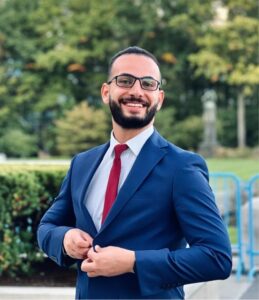 Osama Aljaber serves as the Digital Democracy Specialist at the United Nations Development Programme (UNDP) in New York, where he pioneers the use of new technologies and artificial intelligence to enhance democratic institutions and processes. He works on strategic interventions in areas related to information integrity, electoral support, and inclusivity. His work involves supporting national and regional institutions,civil society organizations, and media organizations, leveraging technological solutions and AI applications. Osama has established and contributed to several national and regional networks aimed at enhancing democracy, as well as civic, political, and digital participation. He holds a Master of Arts in Data, Culture, and Society from the University of Westminster in London and a Bachelor of Science in Computer Information Systems from Hashemite University in Jordan.
Osama Aljaber serves as the Digital Democracy Specialist at the United Nations Development Programme (UNDP) in New York, where he pioneers the use of new technologies and artificial intelligence to enhance democratic institutions and processes. He works on strategic interventions in areas related to information integrity, electoral support, and inclusivity. His work involves supporting national and regional institutions,civil society organizations, and media organizations, leveraging technological solutions and AI applications. Osama has established and contributed to several national and regional networks aimed at enhancing democracy, as well as civic, political, and digital participation. He holds a Master of Arts in Data, Culture, and Society from the University of Westminster in London and a Bachelor of Science in Computer Information Systems from Hashemite University in Jordan.
You can see more about the lineup of experts who will join our team of instructors for our course here.

Knight Center for Journalism in the Americas
300 West Dean Keeton
Room 3.212
Austin, TX, 78712
Phone: 512-471-1391
Email: journalismcourses@austin.utexas.edu

